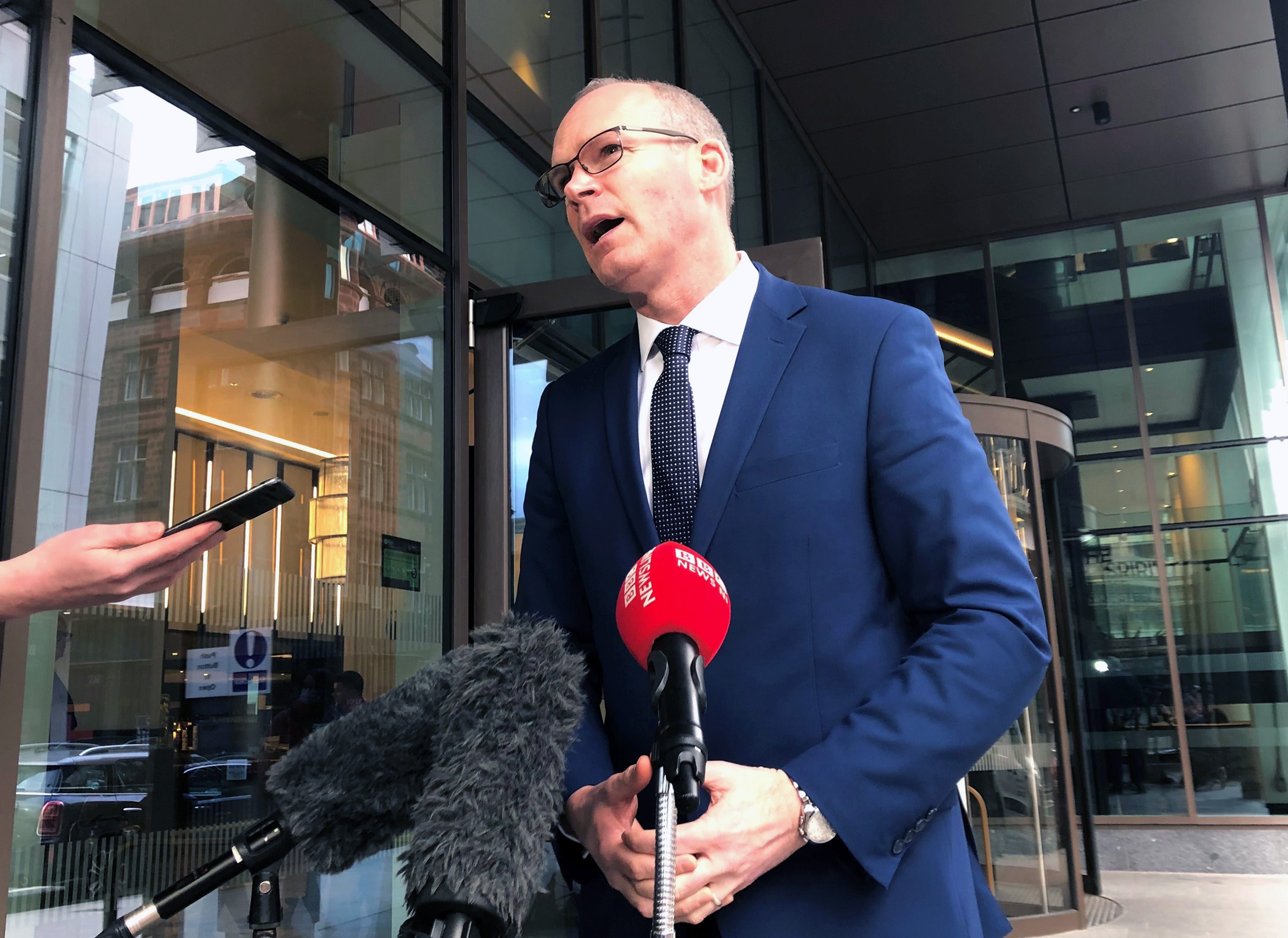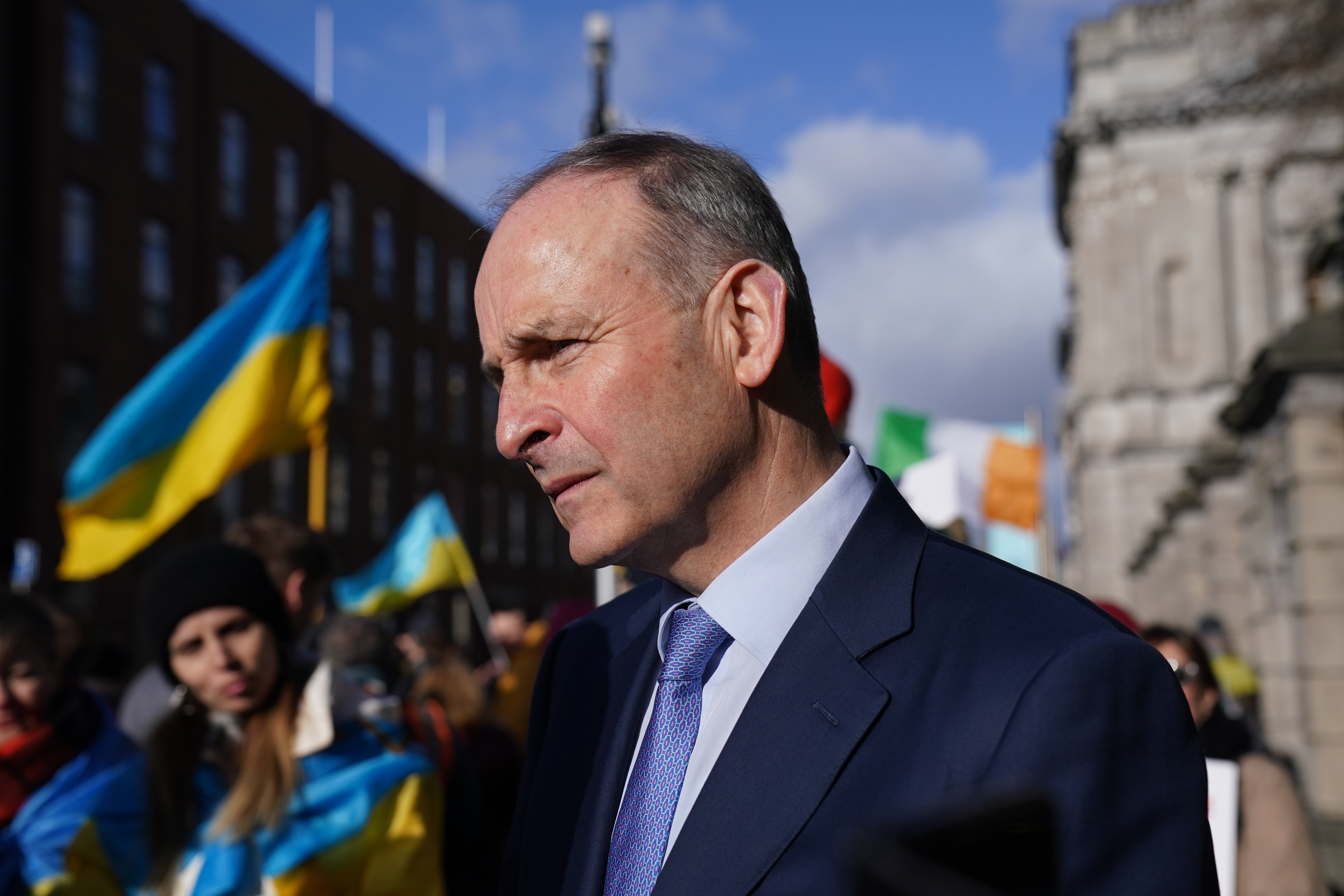
Ireland backs EU plans to freeze the assets of Vladimir Putin and his foreign minister, a Government minister has said.
Speaking in Brussels as he attended a meeting of EU foreign ministers, Simon Coveney said he understands the EU plans to introduce an asset freeze on the Russian president and Sergei Lavrov.
EU leaders agreed a fresh set of sanctions against Russia following an emergency summit in Brussels late on Thursday.
Mr Coveney, the Irish Foreign Affairs Minister, said his country also left open the possibility that the bloc might go further, suggesting Ireland would be open to harsher measures against Russia as war continues to rage in Ukraine.
He condemned the “horrific images” from Ukraine, as capital Kyiv prepares for an all-out assault from Russian forces.
He described them as “the kind of images that I think most people on the continent of Europe felt were consigned to history”.
He added: “We are seeing a full-scale war being waged on one of Europe’s largest countries by a nuclear superpower next door, and we need to respond to that as the European Union.
“We need to get very clear messages that this is completely unacceptable, is breaching international law, is a breach of the UN Charter and is a breach of a country’s sovereignty and right to exist within its own recognised international borders.
“I think for many countries, we’d like to even go further than that package. Certainly from an Irish perspective, we think that the strongest possible act of sanctions needs to be agreed and if we can add to what we are agreeing today then we should, in a third round of sanctions within the next few days.

“I know that the decision has been, I think, made and agreed and we support it, to add the names of Vladimir Putin and Sergei Lavrov to the sanctions list, in terms of asset freeze.
Mr Coveney described such a move as “absolutely appropriate”.
He said the actions by Mr Putin have caused a “fundamental change” to how Europe views security, but he stressed the immediate concern is supporting the people of Ukraine.
Mr Coveney insisted the EU should be “considering the strongest possible package of sanctions”.
He did not rule out following the lead of Poland, which has decided to ban Russian airlines from its airspace.
“What we’re agreeing today is what has been possible to agree across all EU countries. I think that’s a big, big package,” Mr Coveney said.
“We shouldn’t underestimate the scale of that.
“I also think we should have a third round of sanctions ready to add, for example, the Swift payment system as part of that package, but I think we should be open to other proposals as well, absolutely, to lengthen the list in terms of people who are being targeted with asset freezes and travel bans.
“But if there are other suggestions coming from Poland and other countries, we should be open to that.”
Earlier, Mr Coveney had hit back at Mr Lavrov after he referenced the use of the English language in Ireland during a press conference on Ukraine.
“If in Ireland, if they prohibited English language, what would the UK think about it?” Mr Lavrov said.
Also offering the example of the use of French in Belgium, he added: “I can’t imagine that a law like that would last for more than a couple of days or even hours.”
Mr Coveney rubbished the comparison.
In a strongly worded tweet, he said Russia should not try to use Ireland to justify an “unjustifiable war”.
He said the Irish-British relationship is an example of two countries with a “difficult past” that “found a way to shape and sustain a peace process, guaranteeing an absence of violence”.
Meanwhile, Irish premier Micheal Martin described the package of measures agreed to punish Russia for its invasion of Ukraine as “comprehensive” and predicted it would attack the country’s finance, industry, trade, energy and transport sectors.
Mr Martin said the invasion by Russia was a “gross violation” of the territorial integrity of Ukraine.
He admitted there will be “a price to pay” for European countries as a consequence of the sanctions.
He also defended the decision not to remove Russia from the Swift network, an international financial system.
“People have different perspectives on the efficacy or value of Swift in itself, so I don’t think we should singularly focus on Swift because the sanctions will hit hard at the industrial base, in terms of areas that will hurt the Russian economy,” Mr Martin added.
“Over time these sanctions will have an impact. It won’t halt what is happening.”
He also rejected claims that the EU held back in its package of measures.
“We haven’t held things back. The rationale and logic of President Putin that underpins this attack has nothing to do with Swift. What he is doing is reckless, irresponsible and morally wrong,” he said.
“President Putin has decided on this course of action. It is appalling and immoral and putting people at risk.
“Europe has responded very strongly. In its totality it is very strong.
“To launch this brutal attack on the Ukrainian people, to attain some sort of historic ideal he (Putin) has in his head about restoration of empire, harking back to a bygone era.
“We have to take that on board, that that is the mentality and rationale underpinning this.”
He said Ukrainian President Volodymyr Zelensky spoke to EU leaders during the emergency summit on Thursday.
“People were struck by the extraordinary courage of the Ukrainian president,” Mr Martin added.
“It was a moment that caused considerable reflection afterwards, in terms of the political and existential plight that Ukraine is in right now and also the president himself, who said he was staying in Kyiv and really was pleading for any assistance that could be given.”

On Friday, Irish Justice Minister Helen McEntee confirmed her department has removed visa requirements between Ukraine and Ireland.
She said this will help with the “swift exit” of both the Ukrainian family members of Irish citizens, and the family members of people from Ukraine who are resident in Ireland.
It will apply as an emergency measure to all Ukrainians travelling to Ireland with immediate effect.
Ms McEntee said the Irish Government will “work with colleagues on any further EU-wide measures that might assist those fleeing Ukraine”.
Earlier, Irish Government minister Thomas Byrne insisted there is EU unity over the latest package of sanctions.
Mr Byrne played down disagreements with the EU and said the latest package of measures are the “broadest sanctions the European Union has ever imposed on anybody”.
On Friday afternoon, Sinn Fein leader Mary Lou McDonald added her voice to calls for the Russian Ambassador to Ireland to be expelled.
She also called for more punitive measures against Russia.
“We need sanctions which can end Russian aggression against Ukraine and force a complete withdrawal of Russian military force”, she said.







